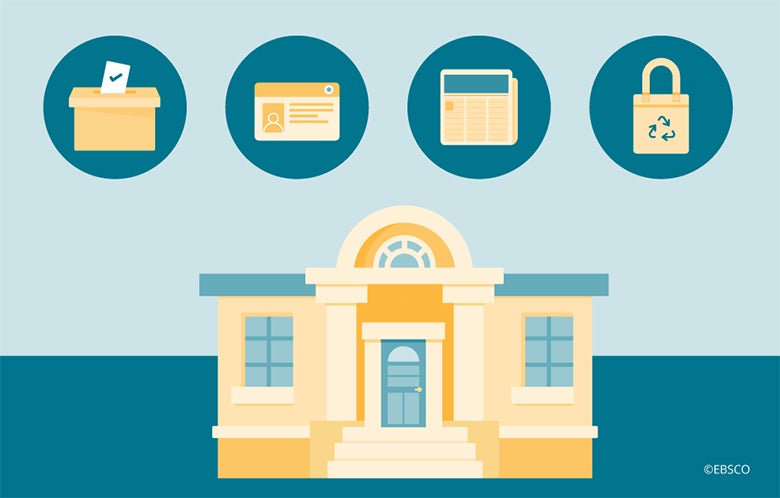Civic literacy is having the knowledge and skills to participate effectively in a democracy. The library’s central role in sharing information, providing opportunities for learning, and facilitating community engagement makes it the ideal institution to foster civic literacy.
Paula Wilson writes, “Librarians have a unique opportunity to position themselves as civic leaders that can bridge the gap between apathy and engagement, bringing community members from unaware to informed.”
By providing access to information resources and programming, librarians can help patrons understand government processes and know how to exercise the rights and obligations of citizenship at local, state, national and global levels.
Late last year, American Libraries magazine published Democracy in Action, a special report providing resources to help libraries connect with elected officials through year-round advocacy, reach and register potential voters, boost civic literacy with community forums and use technology tools to fight fake news.
Librarians have a unique opportunity to position themselves as civic leaders that can bridge the gap between apathy and engagement, bringing community members from unaware to informed.
Librarians have a unique opportunity to position themselves as civic leaders that can bridge the gap between apathy and engagement, bringing community members from unaware to informed.
Here are 10 ideas to help libraries promote civic literacy in their communities:
- Get out the vote. Since 2020 marks the next quadrennial presidential election, it’s a great time for libraries to engage voters, especially youth voters. Librarians from the Government Documents Round Table (GODORT) maintain informational voting and election toolkits for each state that libraries can share on their websites. Don’t forget to keep voter registration forms at the reference desk!
- Demystify the U.S. Census. Create an infographic or flyer that increases awareness about the 2020 Census, how the data is collected and its impact on our democracy. Libraries can also connect community members with the U.S. Census Bureau, which is recruiting thousands of temporary workers to help with the 2020 count. Piktochart lets you create up to five visuals for free.
- Share tips for securing a Real ID. Beginning October 1, 2020, American citizens will need a Real ID in order to fly. The Real ID meets increased security standards for state-issued driver’s licenses and identification cards. Create a flyer or poster informing patrons which documents they’ll need in order to obtain a Real ID.
- Reinforce strategies for spotting fake news. Media literacy is a vital component of civic literacy. Print and hang this poster in several places around the library. High school librarians can use this lesson plan to help students hone their information and media literacy skills. LibraryAware can help you add signage about fake news to your in-library digital displays, self-checks and websites.
- Curate answers to the most popular questions citizens pose. How do I request a sidewalk be repaired? Who do I contact about hauling away my old refrigerator or electronics? What should I do if I encounter injured wildlife? What volunteer opportunities are available in my community? Keep track of the good questions you receive and share the answers in a flyer, in an online guide and/or via social media.
- Extend the library’s reach to those in need. To support individuals or families experiencing underemployment or homelessness, curate information about social service programs that can assist with food, housing, medical and psychological care, and workforce development. Make the information available in print and online.
- Break down the budget. Public libraries can promote a deeper understanding of a town or city’s budget. Create a resource that explains (in the simplest terms) the budget process and how projects are funded.
- Educate citizens about plastic waste reduction initiatives. Many communities are preparing to ban single-use plastic bags (if they haven’t already). Create a flyer or poster that tells patrons where to obtain reusable bags, how to clean and store them, and where to recycle plastic bags and case wrap that cannot be placed in curbside bins.
- Start a Project Citizen initiative. Project Citizen is a public policy program for K-12 students, youth organizations and adult groups that promotes responsible participation in local and state government. Contact the coordinator in your state to learn more about starting a Project Citizen initiative in your community. School librarians can find curricular materials, online resources and professional development for educators.
- Establish civic partnerships. Hannah Buckland, state library program specialist at the Minnesota Department of Education, encourages libraries to join forces with others in promoting civic literacy. “When libraries advocate for a shared goal alongside other institutions — like schools and workforce agencies — we expand the reach of our library network and demonstrate the full breadth of what’s at stake with any issue.”
